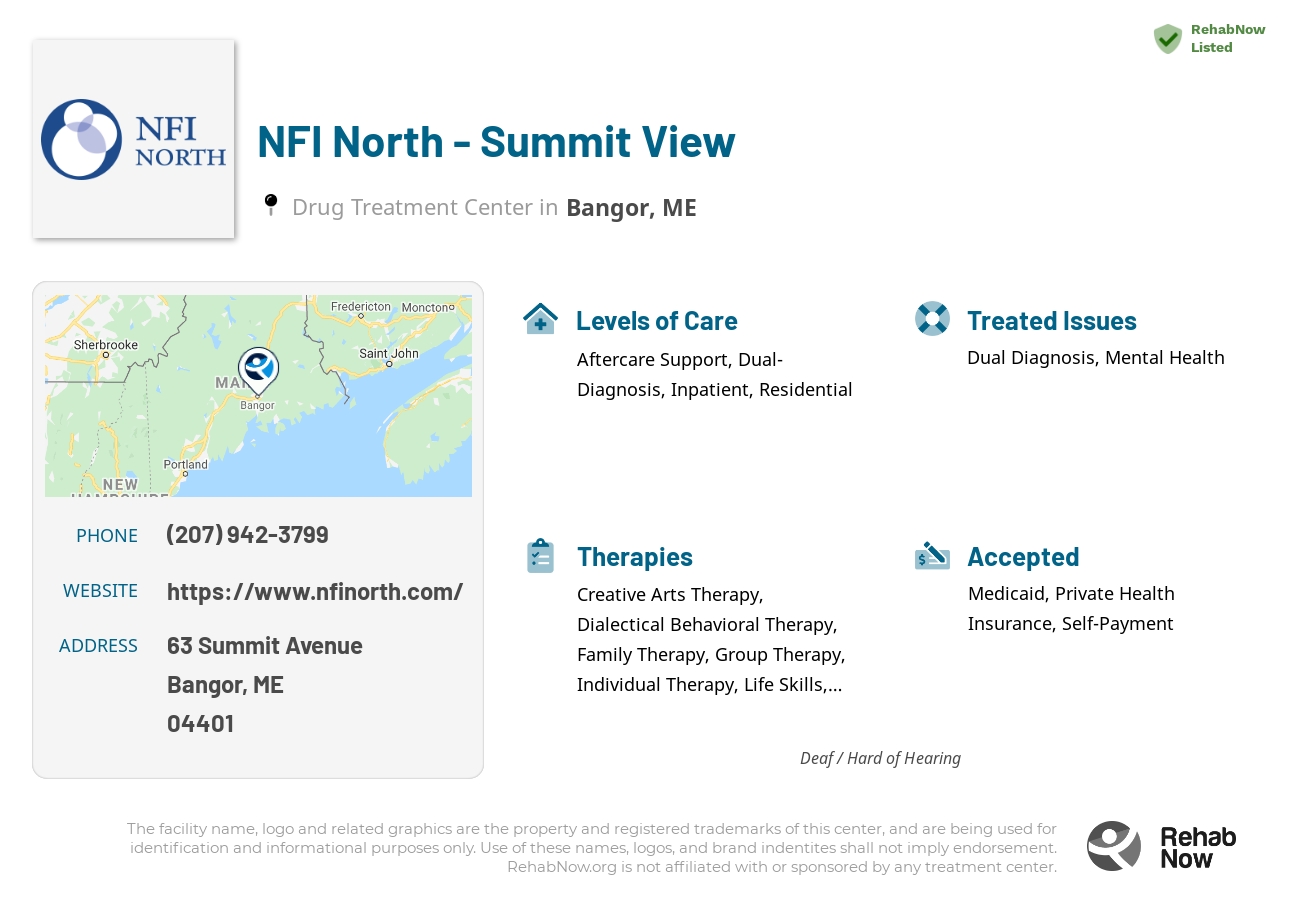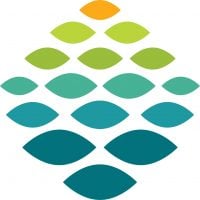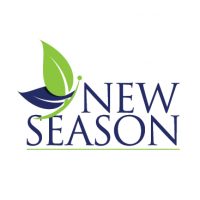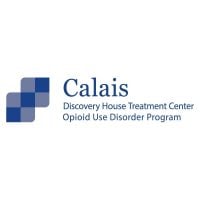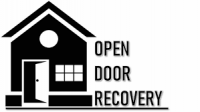NFI North - Summit View
Drug Rehab Center in Bangor, Maine
NFI North - Summit View is a drug treatment center in Bangor, Maine that specializes in helping individuals suffering from Dual Diagnosis, Mental Health, Substance Abuse, Drug Addiction, and Alcoholism, providing a range of treatment options and aftercare support.
About NFI North - Summit View in Maine
NFI North - Summit View, situated in Bangor, Maine, is a specialized residential treatment facility for adolescents aged 10 to 21. It focuses on providing psychosocial and mental health services, employing a unique Normative Community Approach. This approach, alongside its commitment to trauma-informed and culturally responsive care, sets it apart in the field of rehabilitation.
- Employs a Normative Community Approach to foster positive behavioral changes.
- Provides trauma-informed care, ensuring a safe and understanding environment for recovery.
- Offers a cultural and gender-responsive approach to treatment, catering to the diverse needs of its clients.
NFI North - Summit View is accredited by the Joint Commission on Accreditation of Healthcare Organizations (JCAHO), ensuring a high standard of care. Their affiliation with the well-established North American Family Institute (NAFI) underscores their commitment to helping at-risk individuals achieve their full potential through a wide range of services.
The facility addresses a variety of issues including Dual Diagnosis, Mental Health, Substance Abuse, Drug Addiction, and Alcoholism. With treatment methods that include Aftercare Support, Dual-Diagnosis treatment, and both Inpatient and Residential levels of care, NFI North - Summit View is equipped to meet the complex needs of its clients, guiding them towards lasting recovery.
Genders
Ages
Modality
Additional
Accreditations

JCAHO
Conditions and Issues Treated
When someone in struggles with both addiction and mental or emotional illness, this is considered a dual diagnosis. Dual diagnosis treatment can include therapy for these issues to happen simultaneously, which will allow either of them to be treated effectively.
Sometimes people who have suffered from addiction disorder also suffer from co-occurring disorders such as depression, anxiety, bipolar disorder, etc., making them “dual diagnoses.” Dual diagnoses require specialized treatment programs where drug and alcohol addiction are addressed along with psychiatric illnesses. Some rehabilitation facilities provide patients suffering from cooccurrences a program with highly integrated services and a clean environment with few distractions to help them succeed.
Levels of Care Offered
This center offers a variety of custom treatment tailored to individual recovery. Currently available are Aftercare Support, Dual-Diagnosis, Inpatient, Residential, with additional therapies available as listed below.
Inpatient treatment for alcoholism or drug addiction is an option that provides the addict with a supportive environment in which they can stop using. After detox, an inpatient treatment center provides a structured environment for the addict to recover from their addiction and begin taking steps toward a lifetime of sobriety.
This type of treatment is appropriate for addicts that are most in need of intensive care and supervision. This includes those who were unable to quit on their own, those who need more structure than they can get in outpatient treatment, and those whose addiction has led them into legal trouble or severe health problems.
Residential treatment programs are those that offer housing and meals in addition to substance abuse treatment. Rehab facilities that offer residential treatment allow patients to focus solely on recovery, in an environment totally separate from their lives. Some rehab centers specialize in short-term residential treatment (a few days to a week or two), while others solely provide treatment on a long-term basis (several weeks to months). Some offer both, and tailor treatment to the patient’s individual requirements.
Completing a drug or alcohol rehab program is only the first step. Then comes aftercare support. These services include sober living accommodations, career counseling, and AA/NA programs for those struggling with sobriety or who want help maintaining it after initial rehab at an addiction facility.
They can last up to a year or more depending on what’s needed most urgently after the earlier stages are completed.
Therapies & Programs
Because no single treatment is effective for all addicts, the goal of treatment and therapy should be to figure out what works best for each individual. Tolerance and withdrawal levels differ from person to person, affecting the treatment intensity required. Addiction treatment should aim to help addicts develop healthy coping mechanisms for dealing with their addiction and its underlying causes.
Family therapy is beneficial for people who are in addiction treatment services because it offers addicts the opportunity to work with their family members to better understand what led them to make choices that contributed to their addiction.
This type of therapy helps family members reach a deeper understanding of how they can best support their loved one during recovery. It also helps the addict better understand their own motivations and triggers that led them to turn to substance abuse.
Family therapy can help addicts in the following ways:
- Assists family members in processing difficult feelings so they don’t blame or resent recovering addicts
- Assists family members in understanding how addiction has impacted the addict and everyone who is involved with them
- Allows the addict to take responsibility for their actions, while encouraging improved communication skills
- Helps family members understand how to best support an individual in recovery so addicts don’t relapse again.
Group therapy can help build a stronger support system and give addicts in Bangor, ME insight into their addiction that they gain through shared conversations. Group therapy occurs in a controlled group environment, exclusive of one on one meetings. This makes it safer for patients to feel comfortable sharing the struggles they’re going through and gaining perspective.
Trauma therapy is beneficial for people who are recovering from drug addiction because it helps them heal from past traumas that may have caused them to turn to harmful substances or led them to experience negative emotions that contributed to their destructive behaviors.
This type of treatment works by processing difficult experiences so individuals can learn how to process these events without having to turn to substances for coping.
Trauma therapy can help addicts in the following ways:
- Helps individuals understand their experiences and emotional responses to difficult events, including why they turned to drugs or alcohol
- Provides them with comfort and support while working through difficult emotions related to these traumatic experiences
- Offers an opportunity for addicts to have a voice and be heard, which can improve their self-esteem
- Can help them develop coping skills so they can better respond to triggers instead of turning to substance abuse.
Dialectical Behavior Therapy (DBT) is a cognitive-behavioral therapy that helps patients understand the relationship between their thoughts, feelings, and behaviors. It is beneficial for those whose addictions and behaviors stem from severe mental health issues. The term “Dialectic” means the integration of opposites. In substance abuse, DBT refers to accepting the patient’s addiction and working to change their thoughts and behavior. It improves life skills such as controlling intense emotions without reacting impulsively, resolving interpersonal conflicts effectively, and promoting awareness about self and others.
Cognitive-behavioral therapy is a technique that is used to help people with addiction. Specifically, it is a way of identifying thoughts and behaviors that cause the addiction. It is typically used in an individual counseling session.
The content explains cognitive behavioral therapy and how it works to address some behaviors that may be leading to unintended consequences in their life, as well as its benefits for those seeking sobriety.
It works by helping people to talk through their issues and addressing the thoughts that cause said behaviors. It is an excellent way of learning about oneself and one’s perception of the world.
Life Skills Services assist addicts in their recovery by teaching them healthy coping mechanisms that will aid them in becoming sober, focussing on helping people enter into, and maintaining long-term sobriety. Drug Treatment Centers provide Life Skills Services at varying levels of intensity, specific to the needs and requirements of each patient.
The benefits of Life Skills Services offered at NFI North - Summit View:
- Restores hope and empowerment — Helps addicts believe that recovery is possible and instills a new confidence in their ability to achieve a positive, drug-free future
- Enhances family involvement — Encourages families to get involved in the recovery process and supports their understanding and encouragement of healthy behavior.
- Increases patient’s compliance — Helps patients take responsibility for and ownership of their recovery and encourages continued progress
- Reduces relapse rates — Encourages long-term abstinence and emphasizes the importance of establishing sober support systems.
Payment Options Accepted
For specific insurance or payment methods please contact us.
Is your insurance accepted?
Ask an expert, call (888) 674-0062
NFI North Associated Centers
Discover treatment facilities under the same provider.
- NFI North - Miller Terraces in Bangor, ME
- NFI North - Beacon House in Buxton, ME
- NFI North - Dodge House School in Bridgton, ME
- NFI North - Stetson Ranch in Stetson, ME
- NFI North - Sidney Riverbend in Augusta, ME
Learn More About NFI North Centers
Additional Details
Specifics, location, and helpful extra information.
Bangor, Maine 4401 Phone Number(207) 942-3799 Meta DetailsUpdated April 15, 2024
Staff Verified
NFI North - Summit View Patient Reviews
There are no reviews yet. Be the first one to write one.
Bangor, Maine Addiction Information
Prescription opioid abuse is the most common form of substance abuse in Maine. More than 10% of these residents have also admitted to using prescription drugs for non-medical purposes. Between 2013 and 2014, 4 out of every 5 deaths in Maine were caused by illicit drugs. One in five high school students in Maine uses marijuana every single month.
Bangor, ME, has a moderate drug addiction problem, according to the most recent National Survey on Drug Use and Health (NSDUH). In 2018, there were 354 drug fatalities in Maine, compared with 417 in 2017. There are twice as many drug-related emergency room visits in Bangor, ME as the national average. Inpatient rehab in Bangor includes a variety of programs such as extended care and transitional housing.
Treatment in Nearby Cities
- Madawaska, ME (177.1 mi.)
- Mechanic Falls, ME (94.4 mi.)
- Kennebunk, ME (133.0 mi.)
- Mexico, ME (90.0 mi.)
- East Machias, ME (66.9 mi.)
Centers near NFI North - Summit View
The facility name, logo and brand are the property and registered trademarks of NFI North - Summit View, and are being used for identification and informational purposes only. Use of these names, logos and brands shall not imply endorsement. RehabNow.org is not affiliated with or sponsored by NFI North - Summit View.



